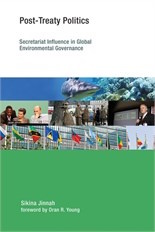Author
Sikina Jinnah
Publication Year
2014
Source
The MIT Press
245 pages
Series
Earth System Governance
Series Editor: Frank Biermann, Oran R. Young
Jinnah examines secretariat influence through the lens of overlap management in environmental governance – how secretariats help to manage the dense interplay of issues, rules, and norms between international treaty regimes. Through four case studies, she shows that secretariats can draw on their unique networks and expertise to handle the challenges of overlap management, emerging as political actors in their own right.
After presenting a theory and analytical framework for analyzing secretariat influence, Jinnah examines secretariat influence on overlap management within the Convention on Biological Diversity (CBD), two cases of overlap management in the World Trade Organization, as well as a case in which the Convention on International Trade in Endangered Species (CITES) secretariat failed to influence political outcomes despite its efforts to manage overlap. Jinnah argues that, even when modest, secretariat influence matters because it can establish a path-dependent dynamic that continues to guide state behavior even after secretariat influence has waned.
| TABLE OF CONTENTS |
Series Foreword
Foreword by Oran R. Young
Acknowledgments
List of Abbreviations
1. Introduction: Secretariats as Overlap Managers
2. Secretariats in Theory and Practice
3. The Analytics of Influence
4. Origins of Overlap Management in the Biodiversity Regime Complex
5. Marketing the Climate-Biodiversity Interface
6. Trade-Environment Politics at the WTO
7. The limits of Secretariats Influence: CITES and the Protection of Commercially Exploited Aquatic Species
8. Conclusions
Appendix A: Case-Specific Methods
Appendix B: Details of Coding Procedure Used in Chapter 5
Notes
References
Index
About the author

Sikina Jinnah
Assistant Professor of International Relations in the Global Environmental Politics Program at the School of International Service, American University, Washington, DC, USA.


